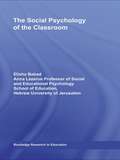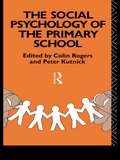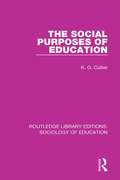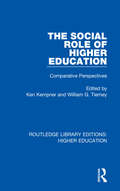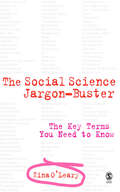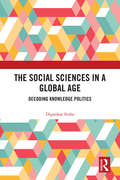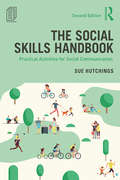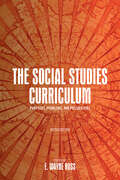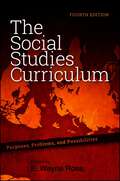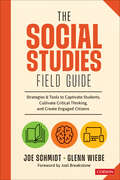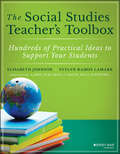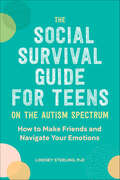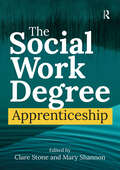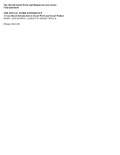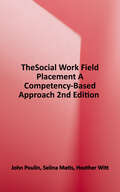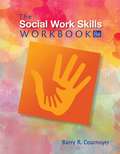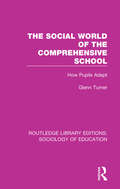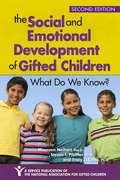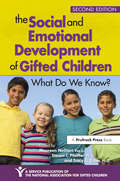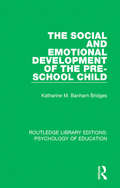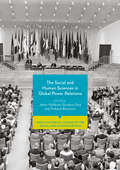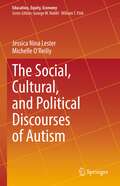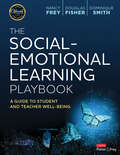- Table View
- List View
The Social Psychology of the Classroom (Routledge Research In Education Ser.)
by Elisha BabadTeachers often find that their training has not provided them with sufficient knowledge and understanding about underlying social forces and processes in their classrooms. This new book addresses this gap by focusing on the social psychology of the classroom, providing the relevant social psychological knowledge and facilitating the application of
The Social Psychology of the Primary School
by Peter Kutnick Colin RogersColin Rogers and Peter Kutnick reassess the role of social psychology in educational practice for the primary classroom. They offer an analysis of the ways in which the process and structure of classroom life affect the interpersonal and academic outcomes of schooling. Social schooling is seen to have a crucial role to play in achieving effective teaching and meaningful learning, while promoting other useful developments in the primary classroom. The authors study classroom interaction and relationships and consider how these might be structured for the best outcomes. With so much attention being focused recently on the National Curriculum, the authors provide a balance for the current curricula-orientated view of teaching by improving understanding of how curricula are implemented in the classroom. Motivation and the social development of primary age children are covered as well as relationships and social interaction in the classroom, gender and special educational needs.
The Social Purposes of Education: Personal And Social Values In Education (Routledge Library Editions: Sociology of Education #13)
by K. G. CollierThis book, first published in 1959, was written to primarily address teachers and students of education, as well as those with a general interest in the changing practices of schools. Under the terms of the 1944 Education Act, which charged Local Authorities with contributing towards the ‘spiritual, moral, mental, and physical development of the community’. The author examines these ideas whilst examining the state of education in the United Kingdom after the 1944 Education Act.
The Social Role of Higher Education: Comparative Perspectives (Routledge Library Editions: Higher Education #13)
by William G. Tierney Ken KempnerOriginally published in 1996 The Social Role of Higher Education is an anthology of nine papers, it presents cases studies showing how culture influences the social role of higher education in various nations. It examines how environments get defined and how they shape universities, and how knowledge and academic work interact in national contexts. This book focuses on how both developed and developing countries' systems of higher education are affected by their own culture and their place within the larger global context.
The Social Science Jargon Buster: The Key Terms You Need to Know
by Zina O′Leary- Are you confused by academic jargon? - Do you know your `discourse′ from your `dialectic′? - Can you tell the difference between `anomie′ and `alienation′? The Social Science Jargon Buster tackles the most confusing concepts in the social sciences, breaking each down and bringing impressive clarity and insight to even the most complex terms. `This book successfully addresses the central task for any teacher of social theory - how to make the material accessible without making it simplistic and banal. The overall effect is a most effective text that hard-pressed students and lecturers will grab with both hands′ - Dave Harris, Senior Lecturer in Social Science This practical, down-to-earth dictionary will help students new to social science discourse gain a thorough understanding of the key terms. Each entry includes a concise core definition, a more detailed explanation and an introduction to the associated debates and controversies. In addition, students will find a useful outline of the practical application of each term, as well as a list of key figures and recommendations for futher reading. This dictionary brings a refreshing clarity to social science discourse, making it essential reading for all students on undergraduate social science courses.
The Social Sciences in a Global Age: Decoding Knowledge Politics
by Dipankar SinhaThe book focuses on the status and role of social sciences in the current millennium. Drawing inspiration from a range of theorists, it critically examines the key debates on the social science stream and focuses on its ir/relevance in our times in the background of changing state-market dialectics. It specifically scrutinises knowledge politics of the global times to reveal how the neoliberal project aligns and fuses steep economic ‘conditionalities’ with professional cultural parameters of higher academia to constrain autonomy and weaken radical expressions in social science pedagogy and research. Asserting that the humanistic core of social sciences has the potential to resist acts of reducing knowledge to a monochromatic form, the book argues that the social science stream can challenge and resist such hegemonic ambitions. It also identifies and analyses the contradictions, dilemmas, predicaments and false steps of social scientists, and avoids a reductive approach based on the ‘west versus non-west’ binary. The volume will be of interest to scholars and researchers of the social sciences in general, and of sociology/politics of knowledge, political theory, political sociology and education in particular.
The Social Skills Handbook: Practical Activities for Social Communication
by Sue HutchingsNow in a revised second edition, this book offers practical guidance for setting up and running social skills sessions. Based on well-established therapeutic principles, this is a flexible, easy-to-use resource suitable for practitioners and professionals working in a range of settings. An overview of social communication theory and the principles of groupwork forms a solid foundation for the session and activity guidance, structured so that the sessions progress from basic skills such as ‘Eye Contact’ and ‘Empathy’ to more complex skills such as ‘Problem Solving’ and ‘Making Friends’. Features of the book include: • Practical and theoretical information for session facilitators • Over 70 versatile, easy-to-follow activity suggestions designed to suit all ages and levels of social ability • An attractive visual layout that includes colour coded sections, tables and illustrations • Brand new activities focused on ‘Dealing with Conflict’ and social communication ‘In the Workplace’. With ever increasing numbers of people being diagnosed with some form of social difficulty, this book will be an essential resource for anybody working within health and social care, education and the community looking to teach and develop social confidence and communication skills.
The Social Studies Curriculum, Fifth Edition: Purposes, Problems, and Possibilities
by E. Wayne RossThe Social Studies Curriculum, Fifth Edition updates the definitive overview of the issues teachers face when creating learning experiences for students in social studies. Renowned for connecting diverse elements of the social studies curriculum—from history to cultural studies to contemporary social issues—the book offers a unique and critical perspective that continues to separate it from other texts. The social studies curriculum is contested terrain both epistemologically and politically. Completely updated and revised, the fifth edition includes fourteen new chapters and covers the politics of the social studies curriculum, questions of historical perspective, Black education and critical race theory, whiteness and anti-racism, decolonial literacy and decolonizing the curriculum, gender and sexuality, Islamophobia, critical media literacy, evil in social studies, economics education, anarchism, children’s rights and Earth democracy, and citizenship education. Readers are encouraged to reconsider their assumptions and understandings of the purposes, nature, and possibilities of the social studies curriculum.
The Social Studies Curriculum: Purposes, Problems, and Possibilities, Fourth Edition
by E. Wayne RossThe Social Studies Curriculum, Fourth Edition updates the definitive overview of the issues teachers face when creating learning experiences for students in social studies. The book connects the diverse elements of the social studies curriculum—civic, global, social issues—offering a unique and critical perspective that separates it from other texts. Completely updated, this book includes twelve new chapters on the history of the social studies; democratic social studies; citizenship education; anarchist inspired transformative social studies; patriotism; ecological democracy; Native studies; inquiry teaching; Islamophobia; capitalism and class struggle; gender, sex, sexuality, and youth experiences in school; and critical media literacy. All the chapters from the previous edition have been thoroughly revised and updated, including those on teaching social studies in the age of curriculum standardization and high-stakes testing, critical multicultural social studies, prejudice and racism, assessment, and teaching democracy. Readers are encouraged to reconsider their assumptions and understanding about the origins, purposes, nature, and possibilities of the social studies curriculum.
The Social Studies FIELD Guide: Strategies & Tools to Captivate Students, Cultivate Critical Thinking, and Create Engaged Citizens
by Joe Schmidt Glenn WiebeYour roadmap to creating engaging and impactful social studies lessons that prepare students for the adventures and challenges of tomorrow In today′s rapidly changing society, it is essential for students to develop critical thinking and evidence-based reasoning skills. The traditional model of rote memorization of dates and facts in social studies classrooms no longer engages students or adequately prepares them for the complexities of the modern world. In The Social Studies FIELD Guide, authors Joe Schmidt and Glenn Wiebe illuminate a transformative path for educators to improve social studies education by moving away from memorization and towards meaningful and active learning. This comprehensive guide delves into the heart of inquiry-based learning, integrating the rich tapestry of primary sources and the cutting-edge potential of educational technology. As the educational landscape evolves, this FIELD—Foundational Evidence, Inquiry, EdTech, and Lesson Design—Guide is a beacon for teachers seeking to bring history and civics alive for their students. By utilizing primary sources and encouraging students to think critically about historical events from multiple perspectives, the FIELD framework fosters a deeper understanding of past events and their relevance to current issues through Innovative Framework: Provides a cohesive structure through the FIELD acronym for creating dynamic social studies lessons Research-Driven Insights: Offers a synthesis of key research in social studies education, equipping teachers with evidence-based strategies for classroom success Practical Application: Presents "Hikes" in each chapter, offering instructional ideas that translate theoretical concepts into actionable classroom practices Technology Integration: Guides educators in leveraging educational technology tools to enhance student engagement and learning outcomes Focus on Inquiry: Integrates inquiry-based learning where students explore authentic questions and investigate real-world problems Step into the future of social studies education with The Social Studies FIELD Guide, an indispensable resource that distills decades of teaching expertise into actionable insights, empowering educators to craft meaningful and engaging lessons without the burden of sifting through overwhelming resources. Each chapter is a wellspring of tools, examples, and practical ideas, ensuring that social studies teachers can navigate the wilderness of modern education with confidence and creativity.
The Social Studies FIELD Guide: Strategies & Tools to Captivate Students, Cultivate Critical Thinking, and Create Engaged Citizens
by Joe Schmidt Glenn WiebeYour roadmap to creating engaging and impactful social studies lessons that prepare students for the adventures and challenges of tomorrow In today′s rapidly changing society, it is essential for students to develop critical thinking and evidence-based reasoning skills. The traditional model of rote memorization of dates and facts in social studies classrooms no longer engages students or adequately prepares them for the complexities of the modern world. In The Social Studies FIELD Guide, authors Joe Schmidt and Glenn Wiebe illuminate a transformative path for educators to improve social studies education by moving away from memorization and towards meaningful and active learning. This comprehensive guide delves into the heart of inquiry-based learning, integrating the rich tapestry of primary sources and the cutting-edge potential of educational technology. As the educational landscape evolves, this FIELD—Foundational Evidence, Inquiry, EdTech, and Lesson Design—Guide is a beacon for teachers seeking to bring history and civics alive for their students. By utilizing primary sources and encouraging students to think critically about historical events from multiple perspectives, the FIELD framework fosters a deeper understanding of past events and their relevance to current issues through Innovative Framework: Provides a cohesive structure through the FIELD acronym for creating dynamic social studies lessons Research-Driven Insights: Offers a synthesis of key research in social studies education, equipping teachers with evidence-based strategies for classroom success Practical Application: Presents "Hikes" in each chapter, offering instructional ideas that translate theoretical concepts into actionable classroom practices Technology Integration: Guides educators in leveraging educational technology tools to enhance student engagement and learning outcomes Focus on Inquiry: Integrates inquiry-based learning where students explore authentic questions and investigate real-world problems Step into the future of social studies education with The Social Studies FIELD Guide, an indispensable resource that distills decades of teaching expertise into actionable insights, empowering educators to craft meaningful and engaging lessons without the burden of sifting through overwhelming resources. Each chapter is a wellspring of tools, examples, and practical ideas, ensuring that social studies teachers can navigate the wilderness of modern education with confidence and creativity.
The Social Studies Teacher's Toolbox: Hundreds of Practical Ideas to Support Your Students (The Teacher's Toolbox Series)
by Elisabeth Johnson Evelyn RamosSocial studies teachers will find classroom-tested lessons and strategies that can be easily implemented in the classroom The Teacher’s Toolbox series is an innovative, research-based resource providing teachers with instructional strategies for students of all levels and abilities. Each book in the collection focuses on a specific content area. Clear, concise guidance enables teachers to quickly integrate low-prep, high-value lessons and strategies in their middle school and high school classrooms. Every strategy follows a practical, how-to format established by the series editors. The Social Studies Teacher's Toolbox contains hundreds of student-friendly classroom lessons and teaching strategies. Clear and concise chapters, fully aligned to Common Core Social Studies standards and National Council for the Social Studies standards, cover the underlying research, technology based options, practical classroom use, and modification of each high-value lesson and strategy. This book employs a hands-on approach to help educators quickly learn and apply proven methods and techniques in their social studies courses. Topics range from reading and writing in social studies and tools for analysis, to conducting formative and summative assessments, differentiating instruction, motivating students, incorporating social and emotional learning and culturally responsive teaching. Easy-to-read content shows how and why social studies should be taught and how to make connections across history, geography, political science, and beyond. Designed to reduce instructor preparation time and increase relevance, student engagement, and comprehension, this book: Explains the usefulness, application, and potential drawbacks of each instructional strategy Provides fresh activities applicable to all classrooms Helps social studies teachers work with ELLs, advanced students, and students with learning differences Offers real-world guidance for addressing current events while covering standards and working with textbooks The Social Studies Teacher's Toolbox is an invaluable source of real-world lessons, strategies, and techniques for general education teachers and social studies specialists, as well as resource specialists/special education teachers, elementary and secondary educators, and teacher educators.
The Social Survival Guide for Teens on the Autism Spectrum: How to Make Friends and Navigate Your Emotions
by Lindsey SterlingConnect with friends and care for your emotions—for teens on the spectrumSocial situations can feel mysterious or tricky to navigate—and if you are on the autism spectrum, they can feel overwhelming. The Social Survival Guide for Teens on the Autism Spectrum unlocks socialization secrets and helps you understand your feelings. Autism books for kids don't always address teenagers' needs, but the practical tips and step-by-step guides in this handbook are perfect for ages 12-16.Learn how to handle situations like managing anxiety, starting a conversation, understanding sarcasm, and dealing with conflict. Build stronger social skills and take care of your emotional health at the same time. This guide can help you feel more confident—and more connected to people you care about.Build new social interaction skills with:Friend fundamentals—Understand what makes a good friend, and learn about informal conversation, nonverbal communication, online etiquette, and more.Social essentials—Discover strategies for joining a group activity, staying flexible, saying no when you need to, and other topics essential to autism books for kids.Insight into you—You are your friend, too! Learn to recognize and express emotions, boost your mood with positive self-talk, and more.Feel more confident and build valued friendships with this helpful handbook.
The Social Work Degree Apprenticeship
by Clare Stone Mary ShannonDeveloped specifically for the social work degree apprenticeship, this book guides apprentices through the unique requirements of this new qualifying route. With contributions from academics, employers and students, it provides a broad and inclusive perspective to build effective working relationships. The social work degree apprenticeship is unlike any other qualifying route to become a professional social worker. Apprentices have to juggling a number of competing demands, balancing their work and learning commitments, the expectations of their employer and those of their university. It can be intense, high-paced and stressful, and very often apprentices are mature students who may not have been in formal learning environment for many years. This book has been written specifically with apprentices in mind and by a range of stakeholders, not just academics, who draw upon their experience and expertise to help apprentices successfully navigate this qualification.Key theoretical concepts are introduced throughout, practical advice given and learning features encourage reflection and application, making this a go-to textbook, whether it’s your first time taking a degree or you’re a mature student returning to study - this is an essential companion to your learning journey, helping you manage your relationship with your university and employer.
The Social Work Experience: A Case-Based Introduction to Social Work and Social Welfare
by Carolyn Wells Mary SuppesThe Social Work Experience: An Introduction to Social Work and Social Welfare introduces students to the social work profession and presents detailed descriptions of eight major fields of practice. The text provides in-depth information concerning major social welfare policies that are are presented in historical perspective, along with thorough discussion of current issues and probable future trends. Major case studies assist students in understanding how professional expertise can advance social-work practice and how enlightened social policies must be present if professional interventions are to be effective.
The Social Work Field Placement: A Competency-Based Approach
by John E. Poulin Selina Matis Heather WittThis book is designed to help BSW and MSW students enrolled in foundation field placements and field seminars structure their field placement learning around the nine Council on Social Work Education (CSWE) profession social work competencies defined in the 2022 Educational Policy and Accreditation Standards (EPAS). Our goal is to ensure that foundation field placement students integrate course learning related to social work competencies with their field placement learning experiences in a purposeful, reflective, and integrated manner. It focuses the field experience and learning opportunities on social work competencies. Each chapter is directly linked to a professional competency with substantive content on the competency, field reflection questions, critical thinking questions, a detailed case example illustrating one or more competencies with discussion questions, and electronic competency resource links to websites and videos.
The Social Work Skills Workbook
by Barry R. CournoyerTHE SOCIAL WORK SKILLS WORKBOOK, Eighth Edition, enables you to develop proficiency in professionalism and the essential social work skills. After introducing 10 dimensions of professionalism, the book offers multiple opportunities to rehearse, practice, and self-assess social work skills needed in a contemporary practice -- helping you become a more confident, ethical, and effective helper. Each social work skill supports one or more of the 43 knowledge and value statements and the 31 practice behaviors that elaborate core competencies in the 2015 Educational Policy and Accreditation Standards (EPAS) of the Council on Social Work Education (CSWE). The skills also align with nationally standardized licensing exams. The text includes explanations grounded in contemporary research, assessment tools and processes, and experiential components that help you get a realistic sense of the field. Case examples and skill-building exercises cultivate your professionalism and expertise.
The Social World of the Comprehensive School: How Pupils Adapt (Routledge Library Editions: Sociology Of Education Ser. #56)
by Glenn TurnerA comprehensive school, like any community, is split into many groups and sub-divisions and contains many different ‘social worlds’ within its structure. First published in 1983, this work is based on a one-year project carried out by the author which involved observation of pupils in lessons and interviews and informal conversa
The Social and Emotional Development of Gifted Children
by Maureen Neihart Tracy Cross Steven PfeifferThe Social and Emotional Development of Gifted Children remains the only book that provides a comprehensive summary of the empirical research on the social and emotional development of gifted children by leading authorities in the field. It includes several features that make it the leading text on what we know about the social and emotional development of gifted children. For example, it summarizes the most significant findings from the empirical research on the topic. It also includes noteworthy variations that have been observed across cultural groups or global contexts. Each chapter also provides a short description of the practical applications that can be made from the research. This second edition includes an entirely new section on the psychosocial aspects of talent development, as well as addresses the burgeoning interest and research base regarding gifted performance. The text also includes several new topics that have emerged from the research in the past decade, such as the neuroscience of talent development and motivation for talent development. This book is a service publication of the National Association for Gifted Children.
The Social and Emotional Development of Gifted Children: What Do We Know?
by Maureen NeihartThe Social and Emotional Development of Gifted Children remains the only book that provides a comprehensive summary of the empirical research on the social and emotional development of gifted children by leading authorities in the field. It includes several features that make it the leading text on what we know about the social and emotional development of gifted children. For example, it summarizes the most significant findings from the empirical research on the topic. It also includes noteworthy variations that have been observed across cultural groups or global contexts. Each chapter also provides a short description of the practical applications that can be made from the research. This second edition includes an entirely new section on the psychosocial aspects of talent development, as well as addresses the burgeoning interest and research base regarding gifted performance. The text also includes several new topics that have emerged from the research in the past decade, such as the neuroscience of talent development and motivation for talent development. This book is a service publication of the National Association for Gifted Children.
The Social and Emotional Development of the Pre-School Child (Routledge Library Editions: Psychology of Education)
by Katharine M. Banham BridgesOriginally published in 1931, the study reported in this book was undertaken as part of the research programme of the Canadian National Committee for Mental Hygiene. It represents a systematic inquiry into the social and emotional behaviour of pre-school children as observed from day to day in a nursery school. The study extended over a period of three years, and it concerned children between the ages of two and five years who were in attendance at the McGill University Nursery School and child laboratory. It can now be read and enjoyed in its historical context.
The Social and Human Sciences in Global Power Relations (Socio-historical Studies Of The Social And Human Sciences Ser.)
by Johan Heilbron Gustavo Sorá Thibaud BoncourtThis volume employs new empirical data to examine the internationalization of the social sciences and humanities (SSH). While the globalization dynamics that have transformed the shape of the world over the last decades has been the subject of a growing number of scientific studies, very few such studies have set out to analyze the globalization of social and human sciences themselves. Arguing against the complacent assumption that Science is ‘international by nature’, this work demonstrates that the growing circulation of scholars and scientific ideas is a complex, contradictory and contested process. Arranged thematically, the chapters in this volume present a coherent exploration of patterns of transnationalization, South-North and East-West exchanges, and transnational regionalization. Further, they offer fresh insight into specific topics including the influence of the Anglo-American research infrastructure and the development of social and human sciences in postcolonial contexts. Featuring contributions from leading international scholars in the field, this work will advance the research agenda and will have interdisciplinary appeal for scholars from across the social sciences.
The Social, Cultural, and Political Discourses of Autism (Education, Equity, Economy #9)
by Michelle O'Reilly Jessica Nina LesterTaking up a social constructionist position, this book illustrates the social and cultural construction of autism as made visible in everyday, educational, institutional and historical discourses, alongside a careful consideration of the bodily and material realities of embodied differences. The authors highlight the economic consequences of a disabling culture, and explore how autism fits within broader arguments related to normality, abnormality and stigma. To do this, they provide a theoretically and historically grounded discussion of autism—one designed to layer and complicate the discussions that surround autism and disability in schools, health clinics, and society writ large. In addition, they locate this discussion across two contexts – the US and the UK – and draw upon empirical examples to illustrate the key points. Located at the intersection of critical disability studies and discourse studies, the book offers a critical reframing of autism and childhood mental health disorders more generally.
The Social-Emotional Learning Playbook: A Guide to Student and Teacher Well-Being
by Douglas Fisher Nancy Frey Dominique SmithTeach skills and foster the dispositions of social and emotional learning in yourself, your students, and your school. Social and emotional learning (SEL) is like any academic subject students learn in school—their learning expands and deepens, year after year. As an educator, what can you do to support not only your students’ well-being and SEL development, but your own? The Social-Emotional Learning Playbook: A Guide to Student and Teacher Well-Being provides the language, moves, and evidence-based advice you need to identify and nurture social and emotional learning in yourself, your students, and your school. Sparking deep reflection and transformative growth, this highly interactive playbook profiles six tenets of social and emotional learning—building resilience, belonging and prosocial skills, emotional regulation, relational trust and communication, individual and collective efficacy, and community of care. Each module features Reflection prompts and self-awareness resources that help teachers identify strengths, target areas for growth, and engage with colleagues over social and emotional development. Strategies for teaching and reinforcing SEL skills that are proven through effect size to increase your impact on students, both academically and socially. Ideas for creating a school culture that manifests social and emotional learning in policies, procedures, and interactions with families and the community. Vocabulary self-assessments, word clouds, and a "Case in point" feature that allows you to analyze a situation, cognitively reframe it, and decide a course of action. With this actionable playbook in hand, jumpstart your social and emotional development journey, reduce compassion fatigue, and create alliances and opportunities for the children and adults in your school community to thrive.
The Social-Emotional Learning Playbook: A Guide to Student and Teacher Well-Being
by Douglas Fisher Nancy Frey Dominique SmithTeach skills and foster the dispositions of social and emotional learning in yourself, your students, and your school. Social and emotional learning (SEL) is like any academic subject students learn in school—their learning expands and deepens, year after year. As an educator, what can you do to support not only your students’ well-being and SEL development, but your own? The Social-Emotional Learning Playbook: A Guide to Student and Teacher Well-Being provides the language, moves, and evidence-based advice you need to identify and nurture social and emotional learning in yourself, your students, and your school. Sparking deep reflection and transformative growth, this highly interactive playbook profiles six tenets of social and emotional learning—building resilience, belonging and prosocial skills, emotional regulation, relational trust and communication, individual and collective efficacy, and community of care. Each module features Reflection prompts and self-awareness resources that help teachers identify strengths, target areas for growth, and engage with colleagues over social and emotional development. Strategies for teaching and reinforcing SEL skills that are proven through effect size to increase your impact on students, both academically and socially. Ideas for creating a school culture that manifests social and emotional learning in policies, procedures, and interactions with families and the community. Vocabulary self-assessments, word clouds, and a "Case in point" feature that allows you to analyze a situation, cognitively reframe it, and decide a course of action. With this actionable playbook in hand, jumpstart your social and emotional development journey, reduce compassion fatigue, and create alliances and opportunities for the children and adults in your school community to thrive.
